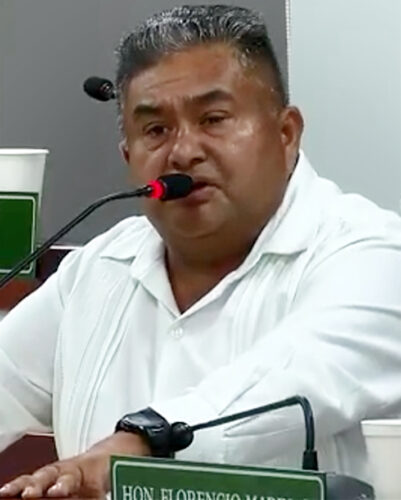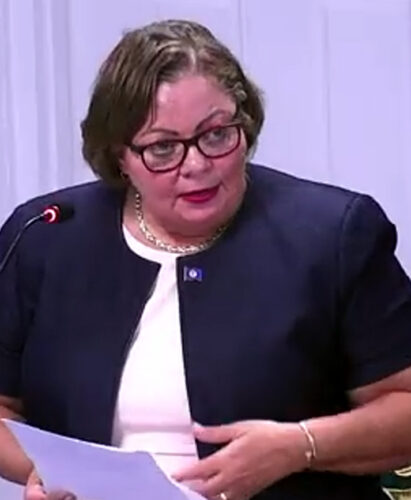
Cane impacted by Fusarium
PM Briceño: “This may be the last crop for some of our cane farmers.”
BELMOPAN, Fri. June 27, 2025
“Thank God the season completes one more crop,” was the message from Sugar Industry Control Board (SICB) chairman Marcos Osorio to Prime Minister John Briceño on Friday after the close of the 2024/2025 sugar crop season when the mill ran out of cane at 7:57 a.m. The Prime Minister, who is now the substantive minister responsible for the sugar industry, read the WhatsApp message as he discussed the existential crisis in the sugar industry at the start of the House meeting.

Prime Minister John Briceno meets with representatives of cane farmers associations
According to the PM, based on the low yield this season and a reduced cane price, cañeros will take home $31 million less this year, and the country will have garnered $53 million less in foreign exchange earnings as compared to the previous season.
As reported by the PM, a total of 880,000 tons of cane was delivered this season, with sugar production totaling just over 78,000 tons. That amount is 147,462 tons of cane less than last season. The ratio of tons of cane to tons of sugar is 11.2/1 compared to 9 tons of cane to one ton of sugar, which is considered a good sugar quality ratio. The crop will go down in history as one of the worst in the last three and a half decades.
With the Fusarium disease expected to spread and become more severe, Briceño said “this may be the last crop for some of our cane farmers.” But, like all challenges they previously faced, Briceño said they do not intend to throw their hands up in the air. He declared, “We will neither grieve nor weep. We will work, because that is what the Belizean people expect of us.” Already, Briceño said, the Ministry of Agriculture will pump $500,000 into a treatment pilot project on two research plots which is showing promising results. That initiative is being spearheaded by the Sugar Industry Research and Development Institute (SIRDI). The plan is to replicate the treatment on a larger scale to a first 2,500 acres. Through IICA’s (Inter-American Institute for Cooperation on Agriculture) Hemispheric Fund for Climate Change, another $100,000 is being sourced for the local testing of another fungus, Trichoderma, which is used to control Fusarium. US$2 million is being sourced through the World Bank’s Climate Resilient and Sustainable Agriculture Project (CRESAP) to strengthen SIRDI’s capacity to produce the Trichoderma. BSI/ASR is also contributing technical expertise through a soil scientist from Florida. This is all apart from the initiative to test Fusarium-resilient sugar cane varieties.
Briceño also announced that on Tuesday, they intend to present a Cabinet paper on a plan to operationalize the recommendations contained in the sugar industry Commission of Inquiry report to move the industry forward. The work is being spearheaded by economist, Dr. Marcelino Avila in conjunction with representatives of all cane farmer associations. The PM informed the House that he, alongside Dr. Osmond Martinez and Minister of Agriculture, Jose Mai, met Thursday with the team at the offices of the Progressive Sugar Cane Producers Association.
Sugar price increase proposal to be tabled to Cabinet
In an interview with Amandala today, Minister of Agriculture, Hon. Jose Mai gave an assurance that, despite the 25,000-ton decrease in sugar production this year, there will be sufficient sugar for the local market, given that consumption is only 12,000 tons. He did cite as an uncertainty, how Mexico is coping with their local demand. Because the price of sugar in that country is three times higher than the price in Belize, Mai stated that contraband may increase, and casually said, “That is why we’re saying that we need to increase our price to maintain our sugar here; and, damn, we will not import sugar from the U.S. this year!” When we pressed him to find out when consumers could expect the local sugar price to increase, Mai revealed that his Ministry, along with the Ministry of Economic Transformation, will table another Cabinet paper making that recommendation. A previous recommendation was rejected, but Mai says it’s only fair “that the farmers get a fair price for their sugar.” The miller (ASR/BSI) and all cane farmer associations except the largest, the Belize Sugar Cane Farmers Association, supported an increase in the local price of sugar.
Mai shared his opinion that perhaps the price should be structured by zones, with Orange Walk seeing a lower price due to less transportation costs to get the sugar to the market, and industrial users paying a different price.
500 cane farmers exited the industry this season?
According to Minister Mai, about 500 cane farmers did not deliver cane during the recently concluded sugar crop season. He believes that indicates that they have exited the industry. However, he did not sound too worried about this development, since he noted that the number of cattle farmers increased by 500. “The good thing under this government, I will say it, is that there is an alternative …” remarked Mai. He cited the expanding coconut industry as another option. He said it would be a sad state if “the sugar industry [was] dead and there’s no other industry to invest in.”
Updated OSH bill finally introduced
BELMOPAN, Fri. June 27, 2025
An updated Occupational Safety and Health (OSH) Bill was finally introduced at today’s House sitting. A version of the bill was first introduced in the House back in January 2014. It went to committee and was never brought back for second reading. Throughout the years since that took place, the National Trade Union Congress of Belize (NTUCB) has been lobbying for the bill to see the light of day, and a “rush the OSH” campaign was launched under the term of past NTUCB president, Luke Martinez.
According to Martinez, though both the Congress and the Belize Chamber of Commerce and Industry reached agreement on the different aspects of the bill, the Ministry of Labour was dragging its feet in taking it to the Labour Advisory Board for it to then go before Cabinet. The Minister at the time, Hon. Oscar Requeña, explained that the bill needed to be updated in the wake of the COVID-19 pandemic and the AI revolution.

Hon. Oscar Requeña – Minister of Education
Today, it was new Minister of Labour, Hon. Florencio Marin, Jr. who introduced the bill, which he described as a landmark piece of legislation and a game changer meant to strengthen the protection of workers. The bill will replace the existing Factories Act and will cover all workplaces and sectors, “ensuring that every worker in Belize has the right to a safe and healthy working environment,” said Marin.
Whereas previous drafts of the bill featured the introduction of an Occupational Safety and Health Authority alongside a dedicated OSH Inspectorate, Minister Marin reported that they accepted the recommendation from the International Labour Organization, which was for a National OSH Advisory Committee alongside a dedicated OSH Inspectorate under the Ministry of Labour. The Committee will include representatives from government, employers and workers. Minister Marin told Amandala that they already have funding to start the work within the Ministry with technical support from the ILO.
The bill, according to Marin, “includes strong and enforceable provisions that clearly define the duties of employers, workers, designers, suppliers and property owners. It incorporates protections for whistleblowers, and prohibits retaliation against those who report unsafe conditions. It mandates the notification and investigation of workplace accidents, incidents and occupational diseases. It also requires the establishment of workplace safety committees, and the appointment of worker representatives, while addressing both physical and psychosocial hazards, including mental health risks.”
The bill has now gone to committee.
Also introduced at the House was a Gaming and Lotteries Control Bill, 2025, which would see the consolidation of the Gambling Prevention Act, the Computer Wagering Licensing Act, the Lotteries Control Act, and the Gaming Control Act. The new bill will allow for the establishment of a Gaming and Lotteries Commission as a statutory board to “lead, direct, regulate, monitor, collect fees and enforcement.” The framework will also provide for the essential standards of gaming consistent with international standards, thereby minimizing the possibility of using gaming for money laundering. In introducing the bill, PM Briceño stated, “This bill is not merely about control; it is about transforming a shadow economy into an accountable, revenue generating asset.”
Another new bill introduced was the School Teachers’ Pension Bill, 2025, which would give legal effect to the commitment of the Government last year to cover 100% of pension and service benefits for teachers and staff in grant-aided schools, whereas it previously only covered 70%. This was known as Proposal 22 in the collective bargaining agreement with the three public sector workers unions back in 2008.
Resolution introduced to support Taiwan
Prime Minister John Briceño introduced the “Resolution to Support Democratic Taiwan and Strengthen Bilateral Bond Motion, 2025.” Via the motion, Belize reiterates its support for Taiwan’s self-determination and territorial integrity in the face of the People’s Republic of China’s ongoing claims. It reiterates Belize’s longstanding call for Taiwan’s inclusion in the international system, including participation in global organizations such as the World Health Organization and the International Civil Aviation Organization. The motion was supported by the Opposition. Present for the introduction and debate was Taiwan Ambassador, H.E. Lily Li-Wen Hsu.
Bail bill passed
The Bail Bill, 2025, was read a second time and passed without amendment. According to the Minister of Home Affairs, Hon. Kareem Musa, the bill consolidates and modernizes the bail framework, which is currently spread across multiple acts and therefore caused confusion for both lawyers and judicial officers. Leader of the Opposition, Hon. Tracy Panton expressed concerns, including about a burden for the marginalized. She pointed to Schedule 1, which lists 15 offenses for which only a judge can grant bail. It includes minor immigration infractions, road traffic harm and firearm-related offences. Panton shared that a young person in rural areas may wait for weeks for a bail hearing due to judges’ availability in those jurisdictions.
Also of concern for the Opposition is the expanded role of the police in bail decisions. They will be able to decide bail in cases punishable by summary conviction. “Let’s look at our youths on the Southside Belize City who are profiled or detained based on reputation rather than evidence, and are especially vulnerable to this reference,” said Panton. She called for safeguards to be introduced against police discretion being applied unequally. She also argued that the arresting officer should not be the one to decide on bail, and cited high bail amounts and stringent surety requirements which she called “lockout for the poor.” Panton additionally highlighted that failure to appear in court can carry up to seven years in prison. “This is oppression disguised as an order,” affirmed Panton, as she made the point that someone who misses court due to a flooded yard or no bus fare could face prison time longer than for the offence itself.
In response, Minister Musa accused Panton of politicizing and grandstanding “what many have acknowledged as an extremely progressive piece of legislation.” Referring to the bail for summary offences being offered by police officers, he clarified that presently, if someone is picked up on a Friday, it would not be until Monday that they would get bail, because police officers are currently not offering bail; but under the new bill, they will be able to do so. He further clarified that judicial officers also include justices of the peace, and argued that the bill actually benefits the marginalized. However, he affirmed that for the more serious offences “nothing changes. You have to get an attorney at law. You have to go to the High Court for bail, including now serious traffic offences—something that has become so prevalent in our country, that individuals are getting away scot-free when they commit manslaughter on our highways. Those individuals must now go to the High Court for bail.”
Also brought for second and third readings was the Central Bank of Belize (Amendment) Bill, 2025, which will provide for the Director General of the Financial Services Commission to be a member of the Board of Directors of the Central Bank of Belize.
Another bill passed was the Law Revision and Law Reform Bill, 2025, which includes the introduction of a Law Reform Commission which will spearhead the modernization of the system of revising, consolidating and editing the laws of Belize.
A fourth bill brought for second and third readings was the National Assembly (Powers, Privileges, and Immunities) Bill, 2025. During the discussion, Opposition Leader Panton raised concern with the provision which criminalizes the sharing and publication of parliamentary documents unless it is authorized. Panton described it as a threat to freedom of expression which “risks silencing journalists, educators and citizens.” She also asked for a review of the section of the bill which would allow the Speaker of the House or a committee chairperson to order a warrant for someone’s arrest without needing a judge’s approval if they don’t respond to a summons. Hon. Julius Espat, Chairman of the Foreign Affairs and Constitution Committee, said those two sections can be looked at some more. The bill was passed with amendment.

Hon. Tracy Panton – Leader of the Opposition
Panton highlights exorbitant school fees as issue of national concern
On adjournment, Opposition Leader Tracy Panton raised, as a matter of national concern, the exorbitant fees at some grant-aided institutions — separate from books, uniforms, tuition and school supplies. She provided examples of three invoices from different schools. Panton outlined that the anxiety for some parents now begins, as the school year is winding down and preparation must begin for the next one. On the invoice for a first form student at one high school, she cited such fees as summer class ($150), learning resources ($100), practical fee for IT ($105), practical fee for expressive arts ($105), and practical fee for technical drawing ($105). At another high school there is an activity and supplemental fee ($740), security and safety fees ($53), a student retreat fee ($25), and RF&G student insurance ($13). The additional fees in one case totaled over $800. A third example included fees for a fair/class fundraising, cleaning and sanitizing, and a monthly newsletter.
According to Panton, summer school has now become mandatory for every child, even if they don’t attend. She called it criminal, and asked that the church/state school system be examined.
Minister of Education Oscar Requeña responded that they are aware that some schools are imposing additional fees that make it more difficult for parents to send and keep their children in school. He reported that they are conducting an assessment of the fee structure, and called on schools to be fair.
Requeña added that the PUP Administration has prioritized policies and programs to assist with keeping students in school and increasing greater access. He cited the program which sees schools receiving full tuition payments for students and support with uniforms, as well as the Healthy Start Feeding Program. Additionally, Requeña noted that the Briceño administration provides assistance to all 31 area representatives to help parents, and said they receive walk-in applications at the District Education Centers.
British Caribbean News


